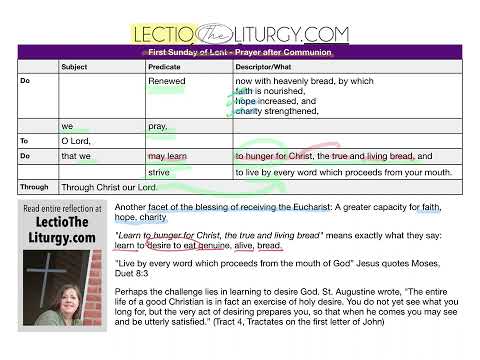Prayer After Communion - First Sunday of Lent
This week we Lectio the Liturgy with the Prayer after Communion for the first Sunday of Lent.
Renewed now with heavenly bread, by which faith is nourished, hope increased, and charity strengthened, we pray, O Lord, that we may learn to hunger for Christ, the true and living Bread, and strive to live by every word which proceeds from your mouth. Through Christ our Lord.
The prayer shows another facet of the beauty of receiving Communion. When we receive the Eucharist, we are renewed and gain greater capacity for the theological virtues, faith, hope, and charity. God gives us these virtues, which enable us to act as His children. We can’t earn them; they are a gift.
To have faith nourished, hope increased, and charity strengthened is a blessing that I haven’t thought much about when I receive communion. Perhaps it’s because there’s so much in this Sacrament: spiritual food, the Body of Christ, our own identity as the mystical body of Christ, and now greater virtues is added to the list. I’m quite confident that we won’t have the complete understanding of the Eucharist until we get to Heaven, when we won’t need to receive communion anymore.
In the next part of the prayer, we ask God that we may learn to hunger for Christ, the true and living bread. These words mean exactly what they say: learn to desire to eat genuine, alive, bread.
It is an interesting thought, isn’t it? True and living, genuine and alive bread. Heavenly bread. The Eucharist. Bread we can’t live without. Bread we should hunger for.
Have you ever had a realization that you can’t wait for the weekend just so you can go to mass? Have you ever felt a hunger for Christ? It’s not a typical physical hunger. This is the type of hunger that makes us realize that we have a desire that only God can satisfy.
This is not the hunger that Satan tempted Jesus with when he met Jesus in the desert. Jesus had fasted for 40 days and Satan is sure he’s wanting to eat. He approaches Jesus with this challenge: change the stone into bread. In his response, Jesus’s quotes Moses in Deuteronomy 8:3. Before entering into the Promised Land, Moses gave the Israelites a review of their desert wanderings. He reminds them that during their journey, God caused them to be hungry and fed them with manna to teach them that "man does not live on bread alone but on every word that comes from the mouth of the Lord.”
We rely on physical food, but do we remind ourselves that we also rely on spiritual food? Just like the Israelites, we, too, live on the word of God, the Scriptures. We also live on the Word of God, his Son, the Eucharist.
Perhaps the challenge lies in learning to desire God. St. Augustine wrote, "The entire life of a good Christian is in fact an exercise of holy desire. You do not yet see what you long for, but the very act of desiring prepares you, so that when he comes you may see and be utterly satisfied.” (Tract 4, Tractates on the first letter of John)
Life is filled with desires, some are good for us and some are not. St. Augustine adds that when we continue to desire, we shall be filled. We just need to pay attention to what it is we desire. <br> Jesus was tempted and won the battle. May we trust in his grace for our own victory to desire the word and the Word that comes from the mouth of God.
Thanks for praying with me,
Julie
